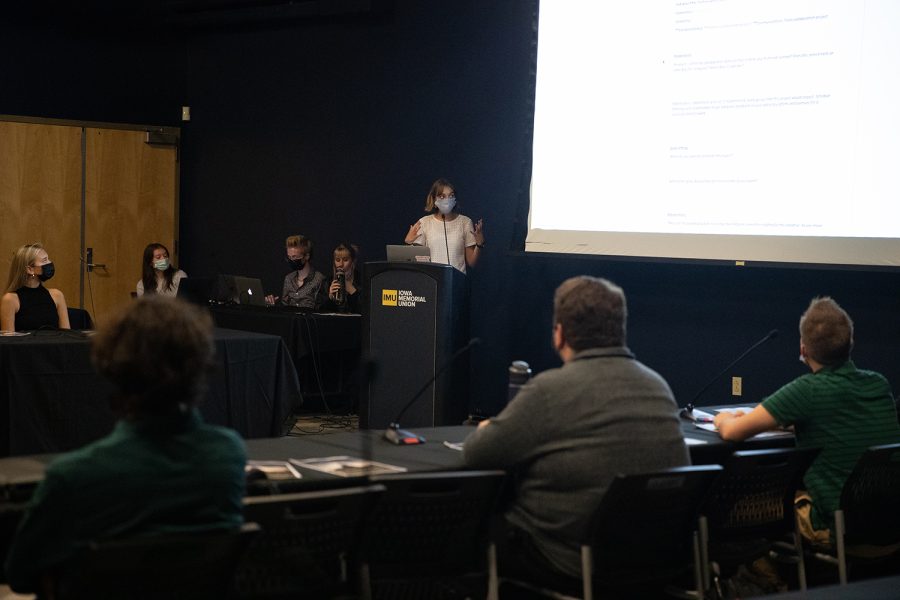USG allocates thousands to Student Video Productions for outdated equipment
Student Video Productions received thousands from the Undergraduate Student Government to spend on upgrading camera equipment on Tuesday.
Regan Smock, president of Undergraduate Student Government, addresses Senators during the Undergraduate Student Government meeting at the Iowa Memorial Union on Sept. 7 2021.
November 10, 2021
More than $25,000 was allocated by the University of Iowa’s Undergraduate Student Government to Student Video Productions for upgrading equipment and facilities repairs.
The funding totals $26,881.46 and comes from the USG contingency fund. The fund, as The Daily Iowan previously reported, is in large surplus. Prior to Tuesday night’s allocation, Finance Committee Chair Emily Hagedorn said that the contingency fund balance stood at about $354,000.
Calvin Leslie, general manager for Student Video Productions, said the money will be used to upgrade the student organization’s current cameras — the Canon EOS C100 — to the Canon EOS C300 Mark III. The funds approved allow the student organization to purchase two cameras at nearly $11,000 each.
“The new industry standard is quickly becoming 4K raw, which is the highest definition and the best type of video file you can have on a non-professional, studio-level camera,” Leslie said. “That’s the biggest thing we’re asking for.”
Leslie said the C300 camera would be able to shoot in 4K resolution, whereas the current camera equipment available to Student Video Productions is only able to shoot at 1080p. He said the new Mark III cameras would have a lifespan for at least the next five years.
Leslie requested additional funds to be allocated for equipment repairs and fixing currently damaged equipment. He also asked for funding to go towards live-streaming equipment, including a Microsoft Surface computer and a green screen.
The resolution, “SVP Equipment Allocation FY22,” passed by a vote of 38-2, after nearly an hour of amendments to the resolution, debate, and questioning of Leslie.
Some members of USG, including Sen. Joshua Brown, wanted to table the bill until next week. Sen. Nick Nachtman voiced concerns about the quality and price of the equipment request.
“I think there are perhaps better options to fulfill this need in a more economic manner,” Nachtman said. “While I do support the idea of this, I don’t know if I could get fully on board with over $20,000 in camera equipment, especially when so many student [organizations] are asking for money all the time.”
Hagedorn addressed the concerns of her fellow senators by comparing this legislation to financial allocations passed in previous years.
“In comparison, this is a moderate capital expenditure request, based on what we had other sponsored student organizations ask for,” Hagedorn said. “Three or four years ago, we [gave] $160,000 to KRUI to replace their equipment.”
In March 2019, USG allocated $156,179.02 to KRUI, a student-run radio station, to update outdated equipment.
Brown proposed adding funding to provide closed captioning on Student Video Productions live streams in order to make them more accessible.
After some debate between Brown and Hagedorn regarding a closed captioning addition resulted in little progress in the process, Brown suggested committing to getting live closed-captioning in the future.
Sen. Natalie Durham requested the addition of an amendment that would force the organization to develop and implement live closed-captioning before the end of the academic year after being awarded this grant, and that amendment passed without opposition by a voice vote.
The legislation passed, allocating the funding to the organization and including amendments committing USG to helping Student Video Productions in establishing live closed-captioning.
“The end of the academic year seems like a super feasible deadline,” Leslie said regarding live closed-captioning. “By the end of the semester, we should have some idea of how we can do that.”















